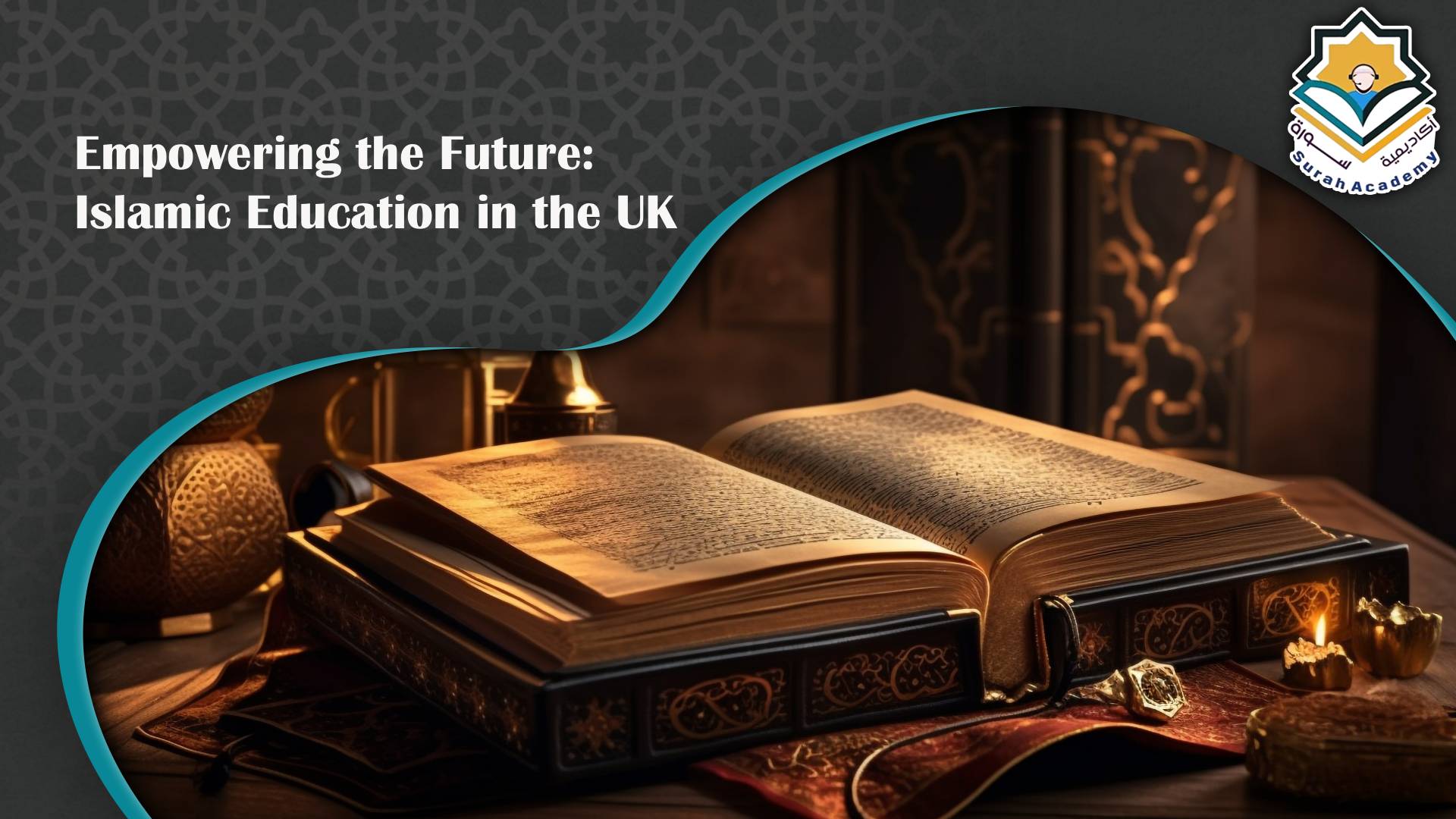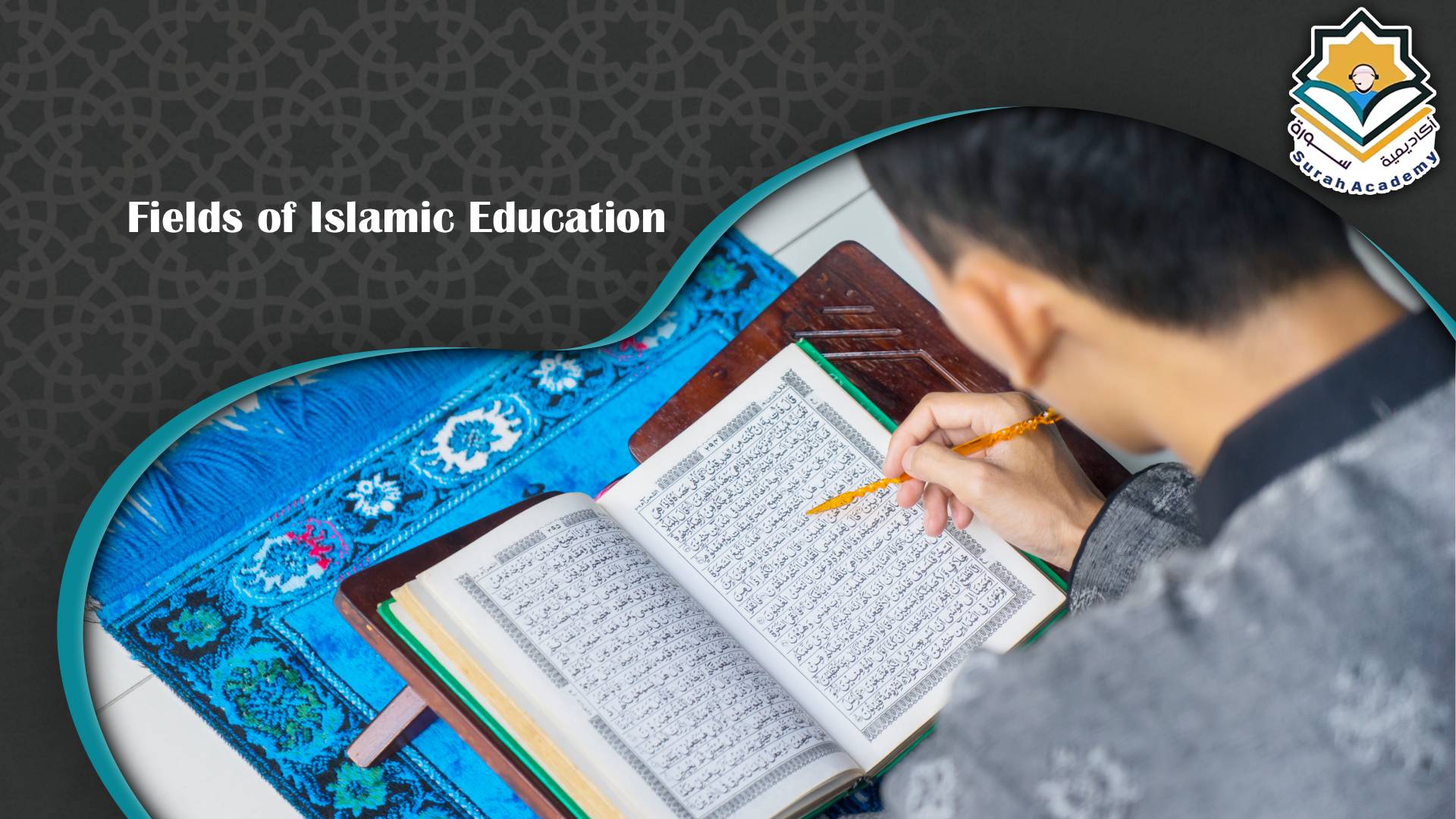The islamic education is a comprehensive system of learning that nurtures both the mind and the soul, combining religious knowledge with moral values and life skills. Surah Academy plays a vital role in delivering authentic and engaging islamic education, offering programs that cover the Quran, Hadith, Fiqh, and Islamic history.
Through its dedicated approach, it guides individuals toward a balanced and purposeful life, fostering character development, spiritual growth, and a deep understanding of one’s responsibilities toward Allah and society.
Empowering the Future: Islamic Education in the UK

Islamic education has always been a fundamental pillar in fostering both personal and community growth within Muslim societies. At its core, it focuses on the holistic development of the mind and soul, nurturing ethical values and spiritual well-being alongside academic excellence.
In the UK’s diverse and multicultural environment, islamic education holds a growing significance in shaping and empowering the future generation of Muslims. Through madrasas, Islamic schools, and specialized educational programs, the Muslim community works to equip its youth with the knowledge, values, and skills needed to face the challenges of modern life while remaining firmly rooted in their faith.
Begin Your Quranic Journey with Surah Academy Today!
Want to improve your Quran recitation? Join thousands of learners worldwide who are studying Tajweed online with Surah Academy. With qualified instructors, flexible scheduling, and customized learning paths, mastering Quranic recitation has never been easier or more accessible. Take the first step toward a deeper spiritual connection—enroll now and experience the difference Surah Academy can make in your journey.

Traditional Islamic Education
Traditional islamic education aims to develop moral character, sincerity, and piety rather than merely filling minds with facts. Rooted in Islamic ethics, it balances personal excellence with the needs of the community, integrating spiritual, cultural, and practical learning.
The Qur’an lies at the heart of its curriculum, with students beginning their studies in the maktab, progressing to the madrassah, and reaching the mosque university.
Education was deeply connected to community life, with teachers serving as moral role models and guides. Classrooms were open to all, regardless of social class, and learning was flexible, focusing on mastery rather than rigid exams. Teaching was interactive, encouraging reasoning and personal growth.
While religious knowledge formed the core, secular sciences and skills were also taught within an Islamic ethical framework. This holistic system shaped individuals whose knowledge benefited both themselves and the Ummah.
Islamic Education Methods
Islamic education focuses on nurturing both the mind and soul through guidance from the Quran and Sunnah. At Surah Academy, students are taught using methods that combine moral upbringing, practical examples, and interactive learning, ensuring a balanced development of knowledge and character.
The methods used to achieve islamic education, as emphasized by Surah Academy, include the following:
Good Example
Being a good example for students is one of the most important methods in islamic education. This means that the teacher should behave in accordance with what they wish to teach. The Quran states: “There has certainly been for you in the Messenger of Allah an excellent pattern for anyone whose hope is in Allah and the Last Day and who remembers Allah often.” [Al-Ahzab: 21]. Therefore, teachers at Surah Academy strive to embody Islamic values in their conduct, serving as role models for their students in behavior and interactions.
Rewards and Punishments
Rewards and punishments are effective tools in islamic education. Rewards are granted for good behavior, while punishments are applied for inappropriate actions. At Surah Academy, this principle is applied by encouraging good deeds through positive reinforcement while addressing harmful behaviors constructively.
Dialogue
Dialogue is an essential method in islamic education. It involves listening to students’ perspectives and encouraging them to share their opinions. Surah Academy promotes respectful and constructive discussions, valuing diverse viewpoints and fostering mutual respect.
Theoretical Knowledge
Theoretical knowledge forms the foundation of islamic education, covering the study of the Quran, Sunnah, and various Islamic sciences. It emphasizes research, verification of sources, and critical thinking, while discouraging reliance on false or misleading ideas. At Surah Academy, students are guided to explore authentic knowledge that strengthens their faith and understanding of Islam.
The Role of Madrasas in the UK in Islamic Education
Madrasas have long been central to islamic education, especially in Muslim-majority countries, and in the UK they play a similar role by offering supplementary learning outside regular school hours. Typically located within or alongside mosques, they provide instruction in Qur’anic studies, Arabic language, Islamic history, and Fiqh (Islamic jurisprudence).
For many British Muslims, the madrasa functions as more than just a place of learning—it is a community hub where children gain religious knowledge while forming lasting connections with peers and elders. This supportive environment fosters a strong sense of identity and belonging, which is particularly important for young Muslims growing up in a predominantly non-Muslim society. Madrasas also give parents confidence that their children are receiving guidance consistent with Islamic values, which may not always be addressed in mainstream education.
Like all educational institutions, madrasas face challenges. There is an increasing need to modernize teaching methods and curricula to meet the expectations of today’s learners. While traditional approaches—such as rote memorization and strict discipline—were once highly effective, there is now a growing preference for interactive, engaging styles that encourage critical thinking and creativity. In response, many UK madrasas are embracing modern pedagogical tools, including digital technology and project-based learning, to ensure students are well-prepared for the future while remaining grounded in their faith.
The Importance of Islamic Education
Islamic education is not limited to teaching religious texts; it is a comprehensive approach that nurtures purpose, moral responsibility, and a strong spiritual identity. In Islam, the pursuit of knowledge is regarded as an act of worship, with the Qur’an and Hadith repeatedly encouraging learning. Therefore, islamic education focuses not only on understanding religious principles but also on developing exemplary character traits such as compassion, integrity, and justice.
In the UK, where Muslims make up a significant part of the population, islamic education plays a vital role in connecting younger generations to their cultural and religious heritage. Amid growing secularism and integration challenges, Islamic schools and madrasas provide safe environments where Muslim children can strengthen their identity while receiving a quality academic education. By combining religious values with academic excellence, this educational approach equips students with the skills, knowledge, and ethical foundation needed for success in various careers and meaningful contributions to society.
Islamic Education in the Digital Age
As technology transforms the educational landscape, islamic education in the UK is adapting to embrace new opportunities. Online platforms and digital resources now play a key role in complementing traditional learning, with Qur’an apps, virtual madrasas, and online Islamic courses making education more accessible to a wider audience.
This shift is especially valuable for Muslim families who lack access to a nearby madrasa or Islamic school. Through online learning, students can study Qur’an recitation, Hadith, and other Islamic subjects from home, while flexible schedules make it easier for working parents to support their children’s religious education.
The COVID-19 pandemic accelerated the adoption of digital learning, prompting many Islamic schools and madrasas to integrate online tools even after returning to in-person classes. This hybrid model—blending face-to-face and online education—offers greater flexibility, personalized learning experiences, and the potential to engage students more effectively in their religious studies.
Read also: online ijazah course
Islamic Schools: Balancing Faith and Academic Excellence
In addition to madrasas, full-time Islamic schools have become an increasingly popular choice for Muslim families in the UK, offering a balanced curriculum that combines secular education with Islamic studies. These institutions provide an environment where students can freely practice their faith while striving for academic excellence.
Many Islamic schools in the UK are recognized for their strong academic results, often surpassing national averages in subjects such as mathematics, science, and English. Alongside academic achievement, they place great emphasis on Islamic values, fostering ethical conduct, charity, and community service. For parents, these schools offer reassurance that their children are being educated in an environment aligned with their cultural and religious beliefs, protecting them from potential conflicts in secular school settings.
The continued success of Islamic schools relies on maintaining high educational standards while remaining true to their religious mission. Balancing the UK’s national curriculum requirements with Islamic studies can be challenging, but many schools have adopted innovative approaches to integrate both effectively. As a result, students graduate with a well-rounded education, equipped to contribute meaningfully to both the Muslim community and wider British society.
Empowering the Future: The Impact of Islamic Education
The influence of islamic education on shaping future generations is profound. By equipping young Muslims with a solid grounding in both religious knowledge and academic achievement, Islamic schools and madrasas prepare them to excel in a diverse and rapidly changing world. These institutions not only safeguard Islamic identity but also nurture a sense of civic duty and global awareness.
The core values promoted through islamic education—such as compassion, integrity, and justice—are universally significant, enabling students to make positive contributions to both the Muslim community and wider society. As Islamic education continues to adapt and expand in the UK, it is set to play a pivotal role in developing a generation of confident, knowledgeable, and ethically driven individuals ready to lead and serve in multiple spheres.
In essence, islamic education in the UK is empowering young Muslims by fostering their intellectual, spiritual, and moral growth. Through traditional madrasas, Islamic schools, and modern digital platforms, it offers the essential tools needed to succeed in both faith and contemporary life, ensuring a bright and purposeful future.
Islamic teaching Resources
Islamic education is one of the essential pillars that should be instilled in Muslim children and youth. It draws upon several key religious sources, including:
The Holy Quran
The Qur’an is the primary foundation of islamic education, containing a wealth of stories, rulings, and values that inspire and guide young Muslims. From an early age, children are encouraged to recite it regularly, understand its meanings, and apply its teachings in daily life. Interpretations are provided in a simple, accessible manner to ensure clear comprehension.
The Sunnah of the Prophet (ﷺ)
As the second source of islamic education, the Sunnah encompasses the sayings, actions, and biography of the Prophet Muhammad (ﷺ). It imparts moral lessons, ethical guidance, and exemplary conduct for children and youth to emulate. The Sunnah is taught consistently, with explanations tailored to their level of understanding.
The Guidance of the Sahabah and Tabieen
Studying the lives of the Prophet’s companions (Sahabah) and their followers (Tabi‘een) offers invaluable lessons in faith, morality, and perseverance. These noble figures serve as role models, demonstrating how Islamic principles can be lived with sincerity, dedication, and honor.
Objectives of Islamic Education
Islamic education encompasses a wide range of objectives that aim to nurture individuals holistically—spiritually, morally, intellectually, and physically—while aligning their lives with the teachings of Islam. These objectives can be outlined as follows:
Faith Objectives
One of the primary aims of islamic education is to instill in students the core beliefs of Islam, including faith in Allah, His angels, His revealed books, His messengers, and the Last Day. It works to strengthen the individual’s spiritual connection with Allah through acts of worship such as prayer, fasting, zakat, and pilgrimage. Moreover, it guides students to ensure that their daily actions, decisions, and lifestyles are in harmony with their faith. This objective focuses on building a firm foundation of belief that can withstand doubts, temptations, and the challenges of modern life.
Moral Objectives
Islamic education seeks to cultivate noble character traits and moral excellence in students. This includes virtues like honesty, trustworthiness, humility, generosity, and brotherhood. It promotes the adoption of core Islamic values such as justice, compassion, tolerance, patience, and sincerity in all dealings. The goal is to ensure that morality is not only taught as theory but practiced consistently in everyday interactions, making it a living part of the student’s identity. Through this, individuals become role models who positively influence their communities.
Spiritual Objectives
A key goal is to nurture the spiritual side of the learner, fostering a deep sense of connection with Allah. This involves teaching remembrance (dhikr), supplication (du‘a), and reflection on the signs of Allah in the Qur’an and the sayings of the Prophet Muhammad (PBUH). It also instills feelings of faith, hope, and acceptance of Allah’s decree, even in difficult times. By enhancing spiritual awareness, students learn to find peace and purpose in life, guided by the understanding that true success lies in seeking Allah’s pleasure.
Physical Objectives
Islamic education recognizes the importance of physical well-being as part of holistic development. It teaches students to care for their health through proper nutrition, cleanliness, and regular physical activity. Sports and exercise are encouraged within the boundaries of Islamic principles, helping to develop strength, endurance, and discipline. Students are also guided to balance their lifestyles—avoiding excess and steering clear of prohibited (haram) activities—so that their bodies remain healthy and capable of serving both their faith and society.
Social Objectives
Another major aim is to teach students the values of cooperation, mutual support, and social responsibility. Islamic education encourages building healthy relationships based on respect, kindness, and empathy. Students learn how to interact with family, friends, and strangers in a way that reflects Islamic manners and etiquettes. By fostering a sense of belonging to the Muslim ummah and the broader society, this objective promotes unity, harmony, and the active contribution of individuals to the welfare of their communities.
Intellectual Objectives
Islamic education seeks to sharpen the intellectual and cognitive abilities of students. This involves training them to think critically, analyze situations logically, and approach problems creatively. It enhances skills in comprehension, memory, and practical application of knowledge. Students are also taught to understand the rational foundations of faith and to respond effectively to misconceptions or doubts about Islam. In this way, the intellect becomes a tool for understanding truth, avoiding error, and living in accordance with the divine guidance.
Fields of Islamic Education

Islamic education encompasses a wide range of disciplines aimed at nurturing faith, character, and knowledge. It guides Muslims towards understanding the Qur’an, developing moral values, and applying Islamic principles in everyday life, ensuring both spiritual and intellectual growth.
Recitation of Quranic Verses
The verse highlights that islamic education places great emphasis on the reading and recitation of the Holy Qur’an. It calls upon Muslims to not only read its verses but also to understand their meanings, follow its rulings, and apply its guidance in daily life. Through the Qur’an, a Muslim strengthens their commitment to the faith, expresses it through words and deeds, and gains insight into the miracles of creation, the history of humanity, the laws of the universe, and scientific discoveries.
Purification
The verse illustrates the importance Islam places on the purification of the soul. islamic education encourages cleansing the heart from evil traits and moral flaws while cultivating virtues such as honesty, kindness, and humility. It stresses the need to uphold good manners, avoid harmful actions, and distance oneself from corrupt behaviors, ensuring that a Muslim’s life aligns with the principles of righteousness and moral integrity.
In conclusion, islamic education serves as a foundation for building strong morals, deepening faith, and guiding individuals towards righteous living. Through the study of the Quran, Sunnah, and authentic Islamic teachings, learners gain both knowledge and character. Surah Academy plays a significant role in preserving and promoting these values, ensuring that future generations remain connected to the true essence of Islam.
